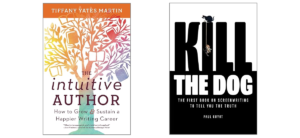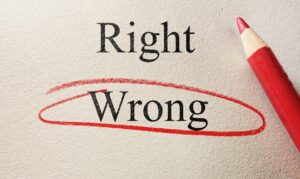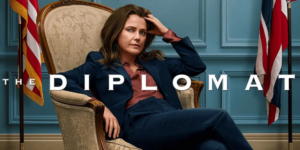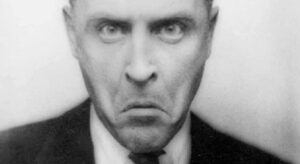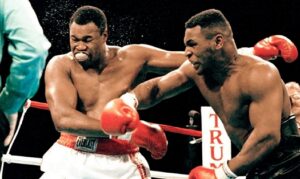Posts by Keith Cronin
As a connoisseur of writing how-tos (and yes, I had to look up how to spell connoisseur – and okay, “addict” might be a more accurate word), I have read a TON of them. And while I find valuable nuggets in nearly all of these books, lately I’ve noticed that many recent writing how-tos are essentially sharing slightly different flavors of some very similar core information.
So when I encounter a book about writing that offers some new (to me, at least) ways of looking at the craft, I sit up and take notice. My gushing ode to Chuck Palahniuk’s Consider This in this 2020 post is an example.
I just finished reading another such departure from mainstream writing how-tos: The Intuitive Author, by WU’s own Tiffany Yates Martin, who, in addition to being a wonderful writer and editor, is also an insanely good teacher and public speaker. Seriously, if you ever have the opportunity to attend one of Tiffany’s sessions or events, take it. And if you’re an author who speaks at literary conferences, trust me: you do NOT want to follow Tiffany. She’s that good.
Having seen Tiffany’s amazing presentation on backstory at WU’s brilliant 2022 OnCon, I knew what an extraordinary editorial mind she has, and how good she is at getting under the hood to amp up and improve your writing at multiple levels. So with The Intuitive Author, I guess I was expecting a book full of deep analysis into the mechanics of writing, along with some sophisticated editorial techniques. Instead, much of the analysis she offers in the book leans more towards the psychology and strategy involved in pursuing – and ideally, enjoying – the life of a writer.
I quickly realized I was not reading The Average Writing How-To, and I dove into the book with my curiosity piqued. (And yes, I had to double-check whether it was “piqued” or “peaked.” Got it right the first time – yay! Hey, it’s the small victories. But I digress…)
In short, The Intuitive Author is filled with insights and perspectives quite unlike those offered in the vast majority of writing how-tos currently on the market. And reading Tiffany’s book made me think about another writing how-to I’d recently read that takes a pretty big departure from most conventional writing wisdom: the provocatively titled Kill the Dog: The First Book on Screenwriting to Tell You the Truth, by author and screenwriter Paul Guyot.
What does this Guyot dude have against dogs, anyway?
Nothing, actually. Instead, the animal Guyot truly hates – and is taking a not-at-all thinly veiled swipe at – is the cat. Specifically, the cat in the well-known “Save the Cat!” series created by the late Blake Snyder.
If you’re not familiar, Snyder’s initial Save the Cat! book (STC to the cool kids) burst onto the scene in 2005 with a VERY structured set of templates for storytelling, which he reverse-engineered from studying many successful movie scripts. Targeted at aspiring screenwriters, Snyder’s methodology offered a compelling framework for them to adopt […]
Read MoreFirst things first: This post has nothing to do with the feminist meme that went viral last spring, asking women whether they’d rather be stuck in the wilderness with a man or a bear. While the conversations and debates that meme inspired were illuminating, divisive, and probably long overdue, I will be focusing on a different type of hirsute carnivore today: the highly successful Hulu TV series, The Bear.
If you’ve ever had the occasion to observe the none-too-svelte physique of the AMC (Adult Male Cronin), it may not surprise you to learn that I am a foodie. Food and me, we’re good buddies. I love learning about it, reading about it, cooking it, and yes, eating it. (Really love that last part.)
When Covid hit, my foodiness (might be a word) only grew, as our household’s frequent dependence on restaurants ground to an abrupt halt, and we found ourselves cooking Every. Freaking. Meal.
Every. Freaking. Day.
An upside of this is that my culinary skills and repertoire increased dramatically. But an even more significant upside was a newfound awareness of something I’d never bothered to explore before: TV shows about cooking. First came The Great British Baking Show, which I’d certainly heard about, but sounded mind-numbingly dull. WRONG. I immediately fell in love with the show, its cast of everyday-people contestants, and yes, Paul Hollywood’s eyes. I mean, come on. Those EYES. But I digress…
I mean, come ON.
Next came Top Chef, which became the new nightly binge-fest in our locked-down home. Then other cooking competition shows (none of which quite hit the mark like TGBBS or Top Chef), followed by the Covid-inspired flood of YouTube home videos about cooking from locked-down professional and aspiring chefs, many of which were extremely informative and entertaining.
The one genre I avoided was the seemingly endless onslaught of “Celebrity Chef Brutally Belittles Aspiring Students/Contestants” shows (ok, that might not be the actual genre name) that had also become increasingly popular, where big-name chefs (usually with very distinctive hairstyles) did their oh-so-shouty best to crush the spirits of less experienced cooks, all in the name of dramatic “reality” TV. Yeah, that’s gonna be a hard pass from me.
Bear with me…
I’d been hearing about The Bear since it came out in the summer of 2022. But I purposely avoided it, for one main reason. EVERY description I read or heard about the show always included the word “stressful,” so I assumed it was a drama about one of those shouty “rockstar” chefs constantly berating his hapless staff. Between that mistaken assumption, and the way the S-word invariably popped up in every discussion of the show, I concluded preemptively that The Bear – despite how good everybody said it was – was simply Not For Keith. Here’s why:
Despite the air of insouciance (a word I am not entirely sure how to pronounce, but am 87% confident that I am using correctly) I strive to convey, it may surprise you to learn that I am a very stressy guy. Like, VERY. About what? You name it – I’m an equal-opportunity stresser, with a long-proven ability to worry and stress over just about anything. And as it happened, I was having a […]
Read MoreAs some of you may already know, in addition to being a highly sought-after shirtless model for romance novel covers, I am also a longtime professional musician, having earned my first money for playing drums at the ripe old age of 14. In fact, music was my fulltime profession until my late 30s. And I didn’t start seriously writing fiction (inasmuch as anything I write could be considered “serious”) until I turned 40. (So you might say that as a writer, I was a 40-year-old virgin. But I digress…)
Coming into a new-to-me art form with a lengthy background in another, I’ve been repeatedly struck by how many parallels I’ve encountered between the two creative paths. It has also been interesting to note the very different experience of learning one art form as a child, and learning another as an adult (inasmuch as a person like me could ever be considered an “adult”).
But I’ll leave the exploration of the whole young-versus-old-artist rabbit hole for some other day. Today, I want to explore five similarities I’ve found in pursuing two art forms – writing and music – at the professional level. I’ll start with the one I think is most important:
1. It’s a business.
Thus far I’ve been calling them art forms, but when you start actively seeking a paying audience for your work – whether written or musical – you quickly become aware that you are dealing with a business, which brings with it numerous rules, obstacles and rites of passage, many of which are not clearly stated or even openly acknowledged. Yeah, it’s fun like that. Trust me: You’re gonna want to wear a helmet.
In each case, because it’s a business, many decisions that will affect your success are A) based on money, and B) out of your hands.
As a musician, this could come down to who is willing to hire you, or to pay to see you perform, or to publish your music (an area that used to be where the money was in songwriting), or to finance your recording and/or tour, or to buy your recordings. Bottom line: It’s about who will spend their money on this thing you chose to do. As the artist, all you can do is make whatever product or service you’re offering as appealing – and as competitive in terms of financial value – as possible.
Writers are in a similar position. Whether you’re pursuing the traditional publishing route, or self-publishing, or trying to get a piece of your dramatic work produced either on stage or screen, somebody else has to decide that what you’re doing (or promising to do) is worth their money.
In both cases, as an artist, you are free to express yourself in any way you see fit. But as an artist who wants to be paid for that art, it quickly becomes obvious that some pathways lead a bit more directly to potential revenue generation than others. Hence my next observation:
2. Genre matters.
For example, a thrilling 70,000-word whodunit with a strong, confident protagonist stands a better chance of selling some copies than a 600-page second-person diatribe exploring the modernist paradigm of discourse that forces the reader to choose between subcapitalist situationism and the dialectic paradigm of consensus. (Incidentally, I have no […]
Read MoreIn the late ‘70s, when I was a freshman at Indiana University in Bloomington, Indiana, a film crew descended upon our quirky little town to shoot a movie. At the time I believe it was called “Bambino,” but that would change. The movie focused on an annual bicycle race the university hosted, called the Little 500 (a reference to the famed Indianapolis 500, the big annual auto race held 50 miles to the north). The Little 500 was the event of the year for students and townspeople alike, and to this day it draws crowds of 25,000 whenever April rolls around.
When you live in smalltown central Indiana, it’s not every day that Hollywood comes calling, and both the city and the university greeted the film project with open arms. It was the talk of the town, and soon we began seeing sections of the campus and surrounding area cordoned off while a cafeteria, courtyard or local street was commandeered to film some scene.
What was the movie about? Nobody really knew, other than that the climactic moment would be a reenactment of our big bicycle race. And – most thrilling of all – there was an open call to attend said reenactment as an extra, since they needed the stadium in which the race was held to be full of people. As a bonus, they also needed a ton of competitive bike riders, and since my dormitory floor had a team that had qualified to compete in the real race, the guys on that team were hired to ride in the reenactment, while the rest of their loyal floormates fake-cheered them on from the stands, hoping to be captured forever on film.
Suffice to say, we were stoked.
It didn’t take long for some of the novelty to wear off. The film crew seemed to be everywhere, and they showed no signs of ever being done. It became tiresome to have to walk around to a rear entrance of an academic hall, because the front of the building was being used for some scene they were shooting.
Even more troubling, we began to notice what they were getting WRONG. We heard talk that the movie would highlight rivalries between students and “cutters” – a derogatory name the filmmakers were using for the local townspeople, harkening back to a bygone era when Bloomington was home to a large workforce of limestone cutters. The problem was, the limestone quarries had been closed for years, there was little or no actual rivalry, and nobody called them “cutters.” “Townies,” maybe. A few called them “stonies” (for “stone cutters”). But what was all this “cutters” nonsense? No, this did NOT bode well.
And then there were the race scenes. Despite the initial surge of interest, it quickly became evident that there was no way to actually fill the stadium where the race was being filmed day after day, because nowhere near enough people were showing up. So the film crew would direct us (yes, yours truly was in some of the crowd scenes) to all shuffle back and forth to different parts of the stadium and sit together in crowded clumps of people. After one shot was completed, we would be ushered to some other section of the stands, and […]
Read MoreThe Apple TV show Ted Lasso has been mentioned here before, most notably in this post by former WU regular Bill Ferris, who spotlighted the show two years ago. But staying true to my lifelong habit of being woefully behind the times (I still haven’t gotten around to seeing that new Kevin Costner movie, Dances with Wolves), I was late to the party in joining the sizable fandom of All Things Lasso.
I’d been hearing about Ted Lasso for a while, but had been dragging my feet about checking the show out. For one thing, it appeared to be about sports. I not only don’t care about sports; I actively dislike them – a holdover from my teenage days when I resented all the attention that high school athletes received, while musicians and other artists were largely ignored. (Yes, I am an attention slut – why do you ask?) It also sounded like a pretty goofy fish-out-of-water premise: an American college football coach who suddenly finds himself transported across the Atlantic to coach a professional English soccer team. So it seemed the level of suspension of disbelief the show would require was already taking this into shark-jumping territory. And then there was that ridiculous ’70s pornstar mustache I kept seeing in photos of the titular character. No, this clearly did NOT look like AKVF (Acceptable Keith Viewing Fare).
I also didn’t like the idea that I’d need to subscribe to yet another streaming platform to watch this show. I’m already shelling out money to Amazon, Netflix, Paramount, Disney, and maybe a couple more. But I couldn’t find any other way to watch this show without subscribing to Apple TV. So I grudgingly signed up for one month, figuring I could quickly tell whether this show was worth continuing my subscription.
Okay, I have to admit: Within an episode or two, I was hooked. I went on to binge-watch all the older episodes, and then began viewing what would turn out to be its final season in real time, sometimes waiting an entire excruciating week between episodes (surely one of the most relatable first-world problems of our day). I thoroughly enjoyed the entire series, and was struck by what a unique experience I had in watching this show, so today I thought I’d explore my Love of the Lasso. Okay, that sounds like a pulp fiction paperback title that could have a VERY dodgy cover, so let’s move on and take a look at why this show stood out for me.
NOTE: I’ve attempted to avoid any spoilers, but I will allude to some of the long-reaching themes and concepts the show explores.
First of all, it’s so gosh-darn different.
One of the few upsides of the pandemic – besides allowing many people to work corporate jobs barefoot and in gym shorts – was the quality of streaming TV shows that emerged. But, perhaps not surprisingly, many of those shows explored some VERY dark themes. Ted Lasso stands out among them for having an unapologetically upbeat main character, who is bound and determined to share his own folksy (and okay, often seemingly corny) philosophy with everybody he encounters. As the series progresses, we learn that Ted’s life is not all sunshine and rainbows, but […]
Read MoreA few weeks ago, my dear friend (and brilliant writer) Jocosa Wade texted me, raving about a new show she was watching. She knew I’d be interested, because the show was created by one of my absolute favorite screenwriters, the marvelous Debora Cahn, about whom I have waxed rhapsodic here in an unabashed WU love letter two years ago. A powerhouse writer with credits on shows including The West Wing, Grey’s Anatomy, Homeland and more, Ms. Cahn has now launched a series of her own on Netflix. It’s called The Diplomat.
And damn, it’s good.
I binged the first season in a matter of days. Admittedly that was not hard to do, since it was only eight episodes, but the good news is that it’s been renewed for a second season. And you can bet I’ll be watching.
From having my heart won over by some of my favorite West Wing episodes, I already knew Debora Cahn had serious game. But with The Diplomat, she really comes into her own, delivering a show that hooks you with the first episode, and never lets go. As the season progresses, Cahn and her writing staff deliver an absolute masterclass for writers of any kind – not just screenwriters.
So today I want to offer some lessons I picked up from my first viewing of Season 1 of The Diplomat (because you better believe I will be re-watching it). To me, the show just freaking WORKS, so I want to take a look at WHY it works so damn well. Here’s what I came up with.
1. She picked a setting that matches the size of her story.
That might seem like an odd observation, so I’ll explain. There are a fair amount of “messages” in this show, and for that to work, the message needs to fit the medium. It’s probably easier to notice this when it doesn’t fit, so let’s look at a few examples.
Aaron Sorkin has long been one of my favorite screenwriters, but even I will admit that sometimes he swings and misses. This is a guy who is ALWAYS trying to tell a Big Story and deliver Important Messages, but he hasn’t always found the right platform. For example, one of his earliest shows was the quirky Sports Night – ostensibly just a show about a sports-themed talk show, such as one might see on ESPN.
Originally positioned as a sitcom, Sorkin’s show soon began exploring deeper themes, veering into more of a comedy/drama category, and getting progressively heavier (okay, sometimes a bit ponderous). Ultimately the show ended up getting canceled after never really managing to find its audience, only becoming popular – and only at a cult level – after going off the air.
Taking some of the themes (and actors) from Sports Night, Sorkin later found his sweet spot with The West Wing, a TV show where he could explore the biggest, heaviest themes imaginable. And it worked, because it was set in the White House, a place where the discussion and execution of Really Big Ideas was a much better fit.
After leaving that show, Sorkin once again scaled down – at least in terms of his setting. His next show was […]
Read MoreA dear friend of mine is having her name changed today. After her 20-year marriage ended in divorce a year ago, she decided to go back to using her maiden name, and today is her day in court, where she’s making the change both legal and official.
It is a powerful gesture, in multiple ways. It excises the ex-husband’s name from her life, but it does even more. My friend’s maiden name happens to be a beautiful and poetic word, literally a word that many people love and even celebrate. Her ex-husband’s surname? Spoken aloud, it sounds more like a cross between a rare skin disease and a Taco Bell appetizer. (Okay, I might be a little biased on that front; I was never fond of the man. But I digress…)
In preparing for today, my friend learned (as countless women have learned when either starting or ending a marriage) that the process of getting one’s name changed can be quite the hassle. But in her case, it’s totally worth it. For her, it simultaneously represents both a return to who she was, and a new beginning. In short, she knows something that I want to remind you of today:
There is power in names. And we as writers should try to leverage that power.
I see a lot of writers going with character names that are rather… generic, if I’m being honest. And while those names might tick off all the boxes for being realistic, believable, and/or even period-correct, I don’t think that playing it safe like that is always the most compelling approach. So today I want to look at the greater impact you can evoke by making bolder choices with your names. But being an open-minded guy who can usually see both sides of an issue, I’ll also offer a couple of examples where seemingly generic names were the perfect choice. But let’s start on the non-generic side of things…
The good, the bad and the ugly
Many authors take advantage of the fact that some names just inherently sound good or bad. Hang on – let me clarify. I’m not saying the actual name sounds good or bad; I’m saying it makes the character sound like a good or bad person. While this is particularly prevalent in fantasy and graphic novels, a good- or bad-sounding name can really help establish a reader’s perception of your character in any genre.
Some names that “bring the good” include Aragorn, Atticus Finch, Forrest Gump, Frodo Baggins, Hermione Granger, Holly Golightly, Jack Ryan, Joe Christmas, Huckleberry Finn, Nero Wolfe, Oliver Twist, and Phileas Fogg – I’m sure I’ll think of three dozen better examples the moment this post is published.
By contrast, some names immediately give you bad vibes, letting you know all is not right with this particular character. I’m writing this paragraph on Valentine’s Day, and I doubt that back in elementary school any of us would have wanted to receive a Valentine from a member of this motley crew: Draco Lucius Malfoy, Cruella de Vil, Dracula, Madame Defarge, Hannibal Lecter, Lord Voldemort, Miranda Priestly, Severus Snape, Nurse Ratched, or Simon Legree. One could argue that some of these names are pretty heavy-handed. And yet, look at how successful those not-so-subtle names have been in entrenching […]
Read MoreI’ve spent virtually my entire life in the entertainment business, starting as a child in local amateur theater, then professional music, then this whole crazy book-writing thing. As different as these disciplines are, they have some core traits in common, chief of which is the need to please an audience. After all, if nobody comes to your show, or listens to your music, or reads your book, aren’t you just shouting into the void?
So a core trait that each successful artist has in common is that they do please their audience. The really successful ones please a really BIG audience.
But it’s never everybody.
Just as not everybody likes chocolate better than vanilla (because the ones who don’t are sadly wrong, but I digress…), not every artistic effort is going to resonate with or appeal to everybody. I think we all know this, deep down, but it’s helpful to remember that the most successful artists are often the ones who evoke the strongest reactions – but those reactions can actually be positive OR negative.
Don’t believe me? Look at the “Best Dressed” or “Sexiest” lists in some popular magazines or social media, and then look at the “Worst Dressed” and “Butt-Ugliest” lists (okay, there’s probably a gentler name for that last one, but let’s be honest: that’s what they’re implying). You’re going to find many of the same names on BOTH lists. Think about artists like Madonna. Lady Gaga. Adam Driver. Kanye West. People either love them, or they hate them. Rarely do these public figures evoke a “meh” reaction.
Um, no hugging, please.
My point is that some of the most successful artists have a truly polarizing effect. And I submit that’s a good thing. Something to aim for, even.
Striving to be inoffensive
I think it’s safe to say, many of us do not aim to polarize – either in real life, or with our fiction. Instead, we play it safe, tiptoeing around sensitive topics to avoid alienating or offending people. And this practice is reinforced constantly, when we see people complaining that entertainers and artists shouldn’t try to impose their opinions on their audience. “Just entertain me,” we are told, “don’t tell me what you believe, or what you think I should believe.”
I saw an example of this just recently, when a musician I’m acquainted with on Facebook posted in support of a regional politician he apparently admires. Personally, I hate the guy he supports, but it’s his FB page, not mine, so I stayed out of the conversation.
But lots of people didn’t. They chimed in from both sides, either praising or deriding his choice. But another sentiment quickly began to surface, which I’d been waiting for. Below is a paraphrased example:
“No matter what your political stance, it is never EVER a good idea to promote it when you are an entertainer, or in business! Never!”
Think about what this comment says to every artist – and even every business owner. In short: How dare you have an opinion? Your sole functions are to entertain me or serve me – and not offend me.
Let’s be honest: Many of us may have felt the same way when seeing an artist or celebrity voice a provocative or controversial […]
Read MoreTrue story: When I was seven or eight years old, I found my calling. I was inspired to become a drummer by Micky Dolenz, the drummer for The Monkees.
Or so I thought.
It turns out the music on the early Monkees albums was not actually played by Micky, Davy, Mike and Peter. Instead, like the vast majority of rock and pop albums in the ’60s and early ’70s, it was played by a group of professional studio musicians who became collectively known as the Wrecking Crew, which included drummer Hal Blaine, whom many consider “the most recorded drummer in history.” Seriously, if you listened to an hour of music on the radio in the ’60s, you probably heard about 40 minutes of Hal on drums. Check out this partial discography, to give you some idea of just how omnipresent his drumming was.
As I grew older and more serious about music, I began to pay far more attention to who was playing drums on the records I liked. I would take deep dives into the recorded works of particular favorites like Hal, who has had an indelible imprint on my own drumming. And I was fortunate enough to grow up in the age of vinyl record albums, most of which came with this mystical, magical thing called “liner notes,” which told you who did what on that record. <begin grumpy old fart rant> If you ask me, one of the biggest downsides of the transition to digital music is the death of liner notes. </end rant>
Although I eventually was allowed to take some drum lessons, and went on to attend a major music conservatory, I determined early on that while books and theory were nice, there was no substitute for directly studying the work of the artists who were actually out there DOING the thing I wanted to do.
When I started getting serious about writing, I took that belief along with me. While I’m an admitted geek about writing how-to’s that explore the theory and mechanics of this thing we do, the way I learn the most useful lessons about writing is to read the books of authors I admire, and then ask, “how did she DO that?”
Which is why I’m embarrassed to admit to a major blind spot in my study of writing. It’s something I’ve known about myself, but have long ignored. But something happened a couple weeks ago that woke me up to what a significant gap it really is, and made me aware that it was time to change my behavior.
So what was it? Just an episode of a show that’s been off the air for 15 years.
Read More
